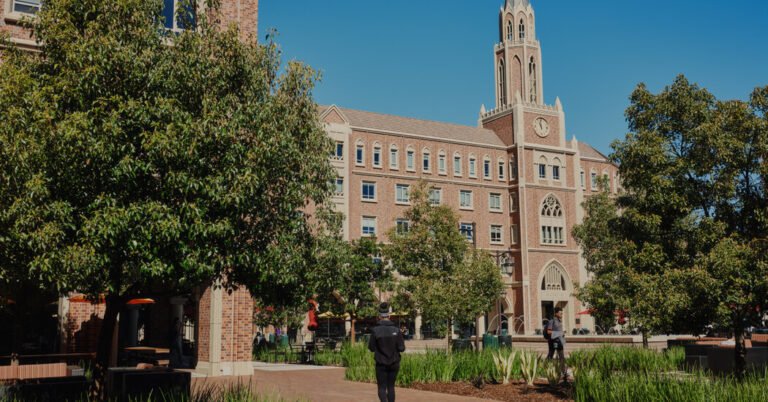
The University of Southern California said it has canceled plans for a graduation speech by this year’s valedictorian, Asna Tabassum, who is Muslim. The school said the decision stemmed from security concerns based on emails and other electronic communications warning of a plan to disrupt the commencement, including at least one that targeted Ms. Tabassum.
“Over the past several days, discussion related to the selection of our valedictorian has taken on an alarming tenor,” said Andrew T. Guzman, the provost, who added that he had made the final decision to choose Ms. Tabassum. “The intensity of feelings, fueled by both social media and the ongoing conflict in the Middle East, has grown to include many voices outside of U.S.C. and has escalated to the point of creating substantial risks relating to security and disruption at the commencement.”
But the university declined on Tuesday to give details of where the communications were coming from or whether they were under criminal investigation. And its decision followed complaints about Ms. Tabassum’s selection by two campus pro-Israeli groups that cited her social media support for Palestinians.
Ms. Tabassum, a biomedical engineering major who identified herself as a first-generation American of South Asian descent, could not be reached for comment. But in a statement, she criticized the decision.
“I am both shocked by this decision and profoundly disappointed that the university is succumbing to a campaign of hate meant to silence my voice,” Ms. Tabassum wrote, adding, “There remain serious doubts about whether U.S.C.’s decision to revoke my invitation to speak is made solely on the basis of safety.”
The Council on American-Islamic Relations, a Muslim civil rights organization, also condemned the decision to cancel the speech as “cowardly” and demanded that U.S.C. reverse it.
Graduation speeches could be the next point of contention for the free-speech debate, which has overwhelmed many universities since the Israel-Hamas war began. University officials have had to handle vociferous debates over pro-Palestinian student protests, which many Jewish students and alumni say often veer into antisemitism. Protesters say that the pushback is an attempt to censor their political beliefs.
But Dr. Guzman, while acknowledging that the decision to cancel the speech broke from university tradition, said, “To be clear: this decision has nothing to do with freedom of speech. There is no free-speech entitlement to speak at a commencement.”
Erroll Southers, who oversees security for U.S.C., said in an interview that the decision followed a barrage of communications threatening the upcoming graduation ceremonies.
“No one could ever remember these kinds of grievances coming to us,” said Dr. Southers, associate senior vice president for safety and risk assurance. “They had identified our valedictorian. They were significant in terms of the specificity of the person, the event, meaning our commencement, and their intent to disrupt our commencement.”
Dr. Southers said it had not been decided whether Ms. Tabassum would be permitted to sit on the stage during the ceremonies.
U.S.C. announced on April 5 that Ms. Tabassum, who is from Chino Hills, Calif., would be the 2024 valedictorian. She was selected from among more than 200 students who met the academic qualification — a grade-point average of at least 3.98. From that group, a selection committee of faculty members evaluated more than 100 applicants.
The announcement of Ms. Tabassum’s selection cited her volunteer work with nonprofit organizations in the Los Angeles area, including a mobile blood pressure clinic that visits homeless shelters and a group she co-founded that distributes medical supplies to areas in need around the world.
Shortly after the announcement, a campus group known as Trojans for Israel issued a statement saying that Ms. Tabassum “openly traffics antisemitic and anti-Zionist rhetoric.” It cited her social media bio that included a link to a page that calls Zionism a “racist settler-colonial ideology.” A similar complaint came from the campus chapter of Chabad. The organizations urged the university to reconsider the selection of Ms. Tabassum.
Anuj Desai, a professor at the University of Wisconsin-Madison Law School, suggested that Ms. Tabassum could have legal grounds to sue, particularly in light of California law that supports students’ First Amendment rights.
“If the reason they’re removing her is because of her views, then that just feels much more like a free speech problem,” he said. “Ordinarily we would say, beef up the security.”
But Mr. Desai said that the university could be warranted in shutting down her speech, if it learned that Ms. Tabassum planned to use the address as a forum, as graduation speakers sometimes do, to discuss their outrage over issues of the day.
“They might legitimately say we don’t want to have any talk about the Middle East — we’re not pro-Palestinian and we’re not pro-Israel,” he said.
In a similarly contentious decision, the City University of New York School of Law has suspended a tradition in which students pick their commencement speaker. That decision, first reported by The Forward, followed last year’s speech, when Fatima Mousa Mohammed, a graduating law student of Yemeni origin, attacked the New York City Police and called on her classmates to fight against “capitalism, racism, imperialism and Zionism.”
CUNY’s Board of Trustees called the remarks “hate speech,” and Hunter College raised concerns about a plan to hold CUNY Law’s 2024 commencement ceremony on the Hunter campus in May. Instead, the law school has announced that the ceremony will be at the Apollo Theater.